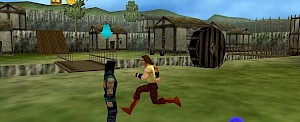Q&A: Seed Studios

Posted 31 Aug 2008 at 08:58 by Nathan Whincup

| "It's urgent that young people start getting education in specific areas; courses that "teach how to make games" won't solve anything, we need specialization in 3D modelling, AI, etc..." |
Seed Studios are a Portuguese development team who are best known for their DS store management title Toy Shop, developed in conjunction with Game Invest. We grabbed the chance to speak to Toy Shop's producer Filipe Pina to find out more about the team, Toy Shop and their opinion on the future of the Portuguese games industry.
This interview was conducted and translated into English by the wonderful Jo�o "Hellfire" Lopes.
N-Europe: How was Seed Studios formed?
Filipe Pina: Seed Studios was the result of a partnership between Norhold Ltd. and LT Studios, whose team developed a three dimensional representation of Oporto's "Pra�a da Liberdade" and a multiplayer-only first-person game set in the Middle East. The studio was founded in 2006 and our offices are located in Oporto, Portugal.
N-E: Are you satisfied with Toy Shop's commercial and critical reception?
FP: We don't have the sales results yet. We have received both positive and negative feedback from the press, so we prefer to wait and hear opinions directly from players.
N-E: The Nintendo DS has been your main choice for development recently, why have you decided to focus on the handheld?
FP: To make a big team you need to start small, our initial idea was to start developing for DS and PSP and grow from there. We started with the DS simply because publishers are usually more eager to publish on it.
N-E: The gaming industry is dominated by large international companies, most of them in Japan, USA and UK. How hard is it for a small Portuguese studio to develop a game? Was there any support from Nintendo?
FP: Nintendo's supported us, besides from selling us the necessary equipment, by pointing us towards some key outsourcing companies.
A game developing studio always faces the same problems, regardless of being big or small, there's an immense lack of specialized personnel and this makes production much more difficult. The best solution for this is outsourcing because the costs are low and the staff involved is generally more experienced.
N-E: Your games seem to be targeted mainly at a younger demographic (which doesn't mean older people can't enjoy them), was this a premeditated decision? If so, what is your reasoning behind it?
FP: Yes and no. For example, Sudoku For Kids on the PC was targeted at children who are learning to read and write, this allowed us to stop and think about what makes a game in a different way than usual. So we had to figure out how to get 4 or 5 year olds playing.
On the other hand, we don't have any intention of developing games solely for the younger crowd.

Toy Shop sees you not only managing a store, but making the toys and interacting with the local town's inhabitants to find out what they want to see.
N-E: Toy Shop has some lovely 3D graphics, which isn't very common in these type of games, and with a lot of studios not making an effort in this front a lot of times due to the nature of the demographic. What lead you to invest in graphical quality as well?
FP: In every game we try our best in every area, be it design, gameplay or audio. The graphical component however, both 3D programming, modelling and 2D illustration might have been more relevant because everyone at Seed Studios is vastly experienced in that area.
N-E: How many people were involved in creating Toy Shop and how long was the game's development?
FP: For those who didn't have the chance to take a look at the credits in the game manual [the game is only out in the US - Ed], there were 10 people involved from Seed Studios, 7 from GameInvest and 30 from Majesco Entertainment.
N-E: When can we expect Toy Shop in Europe?
FP: We don't know when the game will be released in Europe.
N-E: This is the first DS game (if not the first game on a Nintendo console) that will have the option to play in Portuguese - can the Portuguese audience expect this from your next games?
FP: We can't promise that all our games will include a Portuguese option, but we will certainly keep our efforts to make this happen.
N-E: What separates Toy Shop from the rest of the games in this genre?
FP: Toy Shop is different from the rest of the genre, because it approaches the game mechanics from 3 different perspectives.
First, there's the store management, where the player has to pay attention to space management and toy placement and needs to adjust prices according to costumer demand.
Then, there's the toy creation aspect, where the gameplay completely changes, asking the player to take decisions such as how many toys should be manufactured, how much money should be invested in researching new ones as well as some details common in other genres like experience points that allow a higher level of specialization.
Finally, there's a small town for the player to explore and interact with its inhabitants, who in turn, might give ideas about new toys, clothing items and even decorations for the store.

You're sadly unable to muster an army of toys and lead them into battle, like Small Soldiers.
N-E: Do you prefer working on larger number of projects with a short development time or on bigger games that take longer to make?
FP: It depends, but at the moment, the best is to keep average development times at a rate that's economically sustainable, meaning we can't spend two or three years developing and betting everything on a single game. We prefer not to let the development cycle surpass one year.
N-E: What do you think of the Portuguese game development scene right now and how do you see it in the near future?
FP: Compared to 7 or 8 years ago, things are better, there are more game companies and more professionals, which is certainly good. The future is looking bright for companies that stick to developing small and medium games, but unfortunately for those who want to tackle bigger projects, they'll need to hire people from abroad or train people within the company, which in both cases is very time consuming and expensive.
It's urgent that young people start getting education in specific areas; courses that "teach how to make games" won't solve anything, we need specialization in 3D modelling, AI, etc...
N-E: Do you plan on developing games for Wii (retail) or WiiWare?
FP: It's not in our plans at the moment.
N-E: What can we expect from Seed Studios in the future? Can you reveal anything about your upcoming DS game, Aquatic Tales?
FP: Aquatic Tales is like Toy Shop, made in partnership with GameInvest, but for now, we can't comment on the game. We're preparing to announce a new game that's not for a Nintendo platform though. [Seed Studios recently revealed that they are working on a PS3 project, shown behind closed doors at Leipzig - you can see a piece of art for it here - Ed]
N-E: How much would you pay or how far would you go to see Nintendo of America president Reggie Fils-Aime singing a rendition of Frank Sinatra's My Way?
FP: If you're talking about the Frank Sinatra version... not much, but if he'd sing the Sid Vicious version, then things would be different!
We would like to thank Filipe Pina for his time and wish him and his team the best of luck for future projects.






















